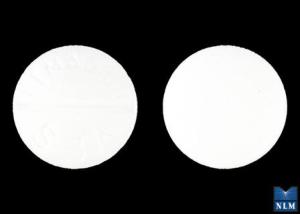Procyclidine Disease Interactions
There are 10 disease interactions with procyclidine.
- Autonomic neuropathy
- GI obstruction
- Glaucoma
- Obstructive uropathy
- Tardive dyskinesia
- Infectious diarrhea
- Cardiac disease
- Liver disease
- Hypertension
- Hyperthyroidism
Anticholinergics (applies to procyclidine) autonomic neuropathy
Major Potential Hazard, High plausibility.
Agents with anticholinergic activity can exacerbate many of the manifestations of autonomic neuropathy, including tachycardia, anhidrosis, bladder atony, obstipation, dry mouth and eyes, cycloplegia and blurring of vision, and sexual impotence in males. Therapy with antimuscarinic agents and higher dosages of antispasmodic agents (e.g., dicyclomine or oxybutynin) should be administered cautiously in patients with autonomic neuropathy.
Anticholinergics (applies to procyclidine) GI obstruction
Major Potential Hazard, High plausibility. Applicable conditions: Gastrointestinal Obstruction, Esophageal Obstruction
Anticholinergics are contraindicated in patients with obstructive diseases such as achalasia, esophageal stricture or stenosis, pyloroduodenal stenosis, stenosing peptic ulcer, pyloric obstruction, and paralytic ileus. Anticholinergics may further suppress intestinal motility with resultant precipitation or aggravation of toxic megacolon.
Anticholinergics (applies to procyclidine) glaucoma
Major Potential Hazard, High plausibility. Applicable conditions: Glaucoma/Intraocular Hypertension
Anticholinergic agents are contraindicated in patients with primary glaucoma, a tendency toward glaucoma (narrow anterior chamber angle), or adhesions (synechiae) between the iris and lens, as well as for the elderly and others in whom undiagnosed glaucoma or excessive pressure in the eye may be present. Because anticholinergics cause mydriasis, they may exacerbate these conditions.
Anticholinergics (applies to procyclidine) obstructive uropathy
Major Potential Hazard, High plausibility. Applicable conditions: Urinary Retention
In general, the use of anticholinergic agents is contraindicated in patients with urinary retention and bladder neck obstruction caused by prostatic hypertrophy. Dysuria may occur and may require catheterization. Also, anticholinergic drugs may aggravate partial obstructive uropathy. Caution is advised even when using agents with mild to moderate anticholinergic activity, particularly in elderly patients.
Anticholinergics (applies to procyclidine) tardive dyskinesia
Major Potential Hazard, High plausibility.
Anticholinergic agents and agents with secondary anticholinergic activity may aggravate tardive dyskinesia or induce previously suppressed symptoms. Therapy with these agents should be avoided, if possible, or administered cautiously in patients with preexisting tardive dyskinesia, particularly in the elderly. If tardive dyskinesia symptoms develop or worsen during treatment with an anticholinergic agent, prompt withdrawal of therapy will provide better chances of improving the condition.
Antiperistaltic agents (applies to procyclidine) infectious diarrhea
Major Potential Hazard, High plausibility. Applicable conditions: Infectious Diarrhea/Enterocolitis/Gastroenteritis
The use of drugs with antiperistaltic activity (primarily antidiarrheal and antimuscarinic agents, but also antispasmodic agents such as dicyclomine or oxybutynin at high dosages) is contraindicated in patients with diarrhea due to pseudomembranous enterocolitis or enterotoxin-producing bacteria. These drugs may prolong and/or worsen diarrhea associated with organisms that invade the intestinal mucosa, such as toxigenic E. coli, Salmonella and Shigella, and pseudomembranous colitis due to broad-spectrum antibiotics. Other symptoms and complications such as fever, shedding of organisms and extraintestinal illness may also be increased or prolonged. In general, because antiperistaltic agents decrease gastrointestinal motility, they may delay the excretion of infective gastroenteric organisms or toxins and should be used cautiously in patients with any infectious diarrhea, particularly if accompanied by high fever or pus or blood in the stool. Some cough and cold and other combination products may occasionally include antimuscarinic agents for their drying effects and may, therefore, require careful selection when necessary.
Anticholinergics (applies to procyclidine) cardiac disease
Moderate Potential Hazard, Moderate plausibility. Applicable conditions: Cardiovascular Disease
Anticholinergics block vagal inhibition of the SA nodal pacemaker. Therapy with anticholinergics should be administered cautiously to patients with tachycardia, congestive heart failure, or coronary artery disease. Premature ventricular depolarization, ventricular tachycardia, and fibrillation associated with anticholinergics are rare.
Anticholinergics (applies to procyclidine) liver disease
Moderate Potential Hazard, Moderate plausibility.
The clearance of anticholinergics may be decreased in the presence of liver disease. Therapy with anticholinergics should be administered cautiously and may require less frequent dosing to avoid adverse effects in patients with liver disease.
Anticholinergics (applies to procyclidine) hypertension
Minor Potential Hazard, Moderate plausibility.
Cardiovascular effects of anticholinergics may exacerbate hypertension. Therapy with anticholinergic agents should be administered cautiously in patients with hypertension.
Anticholinergics (applies to procyclidine) hyperthyroidism
Minor Potential Hazard, Low plausibility.
In general, agents with anticholinergic activity may exacerbate hyperthyroidism. Therapy with anticholinergics should be administered cautiously in patients with hyperthyroidism. Thyroid levels should be monitored if usage is prolonged.
Switch to professional interaction data
Procyclidine drug interactions
There are 333 drug interactions with procyclidine.
Procyclidine alcohol/food interactions
There are 2 alcohol/food interactions with procyclidine.
More about procyclidine
- procyclidine consumer information
- Check interactions
- Compare alternatives
- Reviews (8)
- Side effects
- Drug class: anticholinergic antiparkinson agents
Related treatment guides
Drug Interaction Classification
| Highly clinically significant. Avoid combinations; the risk of the interaction outweighs the benefit. | |
| Moderately clinically significant. Usually avoid combinations; use it only under special circumstances. | |
| Minimally clinically significant. Minimize risk; assess risk and consider an alternative drug, take steps to circumvent the interaction risk and/or institute a monitoring plan. | |
| No interaction information available. |
See also:
Further information
Always consult your healthcare provider to ensure the information displayed on this page applies to your personal circumstances.


